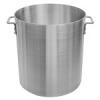I agree with MDaleDDF.
Over 30 years ago I went for an interview at a hotel franchise company, I was working as a professional chef with Hilton and always thought it would be cool to be a hotel inspector (QA) but the requirement was that I had to have "at least" 4 years of college and a degree - preference on a B.S.
Heck, I didn't even have a high school diploma, but what I had was a lot of experience from growing up in a family restaurant operation, moving up from salt and pepper shaker filler when I was 6 years old to loading the soda fountain machines, to dishwasher, pot washer, pantry runner, dessert station, bakery, Pantry prep, cook, sandwich maker, line cook, banquet cook and into the role of a Roundsman Chef with Hilton, then into a food safety role with a new division of the company and internal auditing of the entire hotel systems - oh, I also cleaned the bathrooms and took the garbage out to be compacted - this is called experience.
And I think because I didn't have that HS thing and the BS and college time I worked even harder at learning and putting into practice what I learned, I even volunteered time on the hotel rooms side because I wanted to learn about doing hotel inspections.
When I walked into the Managing Director's office at another hotel franchise company I didn't even have a resume, had not filled out one of their applications (because the receptionist forgot to ask me to fill one out) and when Bob asked me what jobs I had had I told him and he found it fascinating that I did not have all the educational "degrees" etc and flat out laughed when I said I did not have a resume.
But we talked and discussed the restaurant and hotel business and then he looked up at a Regional Director for one of the hotel companies that was sitting in at the table and said - Dick, you don't have degree do ya? Dick said, no - I have a lot experience like this guy does.
I was hired, I started the next day in a training session at a conference room that held 20 people - 18 of which had degrees - Bob told me not to mention my not having that stuff because it was a requirement for getting the position- so I didn't.
As we would find out however, Dick and I had the most experience and experience always wins.
For you I would suggest you stay in a Quality role - learn all you can, get into an assistant role, then work on becoming a Quality Assurance Manager or similar before you venture into an Auditor role - as you need to understand fully what you are auditing/inspecting.
One thing I would suggest is to wait a bit of time to take any FDA, USDA, etc courses because there is about to be MAJOR ELIMINATIONS and changes with rules and regulations from these agencies that will greatly effect food companies and this is due to the agencies themselves making unconstitutional rules, laws, etc - I imagine based on what I have studied and listened to that all or at least large chunks of FSMA will become a thing of the past - if they haven't already started the slide.














